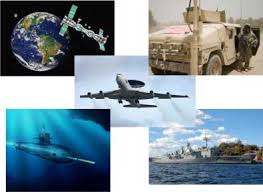Defense Industry Calls for STEM Talent
source: https://www.afcea.org
In the information age, military operations are becoming more and more dependent on network-based capabilities. Meeting the rising communication technology challenges of the future means having a workforce versed in science, technology, engineering and math, leaders suggest.
Barbara Borgonovi, vice president, Integrated Communication Systems, Raytheon Space and Airborne Systems, shared that talented workers are needed to fill employment gaps at defense companies as well as in the military. She refers to the challenge as the talent imperative.
To fill positions, industry and the government need to change how they identify, hire and retain talent, Borgonovi said.
“For years, we’ve heard about the challenge that we don’t have enough college students that are going to study science, technology, engineering or math, STEM,” she stated. “And that’s absolutely true.” The United States has seen some progress in STEM education. Between 2000 and 2014 there was a 53 percent increase in the number of students pursuing STEM degrees, Borgonovi cited. However, it is not enough, she stated.
“Technology could be as important as any weapon for the United States’ ability to maintain its advantage over adversaries,” Borgonovi said. “If your company is in the business of providing secure protected network services for the military, you are already a part of our nation’s defense. So it’s incumbent upon each of us to help bring these technological solutions forward and support the next generation of military network.”
Rear Adm. Christian “Boris” Becker, USN, commander of the Navy’s Space and Naval Warfare Systems Command (SPAWAR), explained how the command is heavily technically oriented. “We’re a tech-savvy workforce of about 10,500 folks, about 9,500 civilians,” he noted. “You can see the degree programs. We have a pretty high concentration of Ph.D.s doing phenomenal research in conjunction with the Office of Naval Research.”
Still, SPAWAR has unmet needs for data scientists and specialists in communications technologies, such as high energy communications and very low frequency-based technologies. “It’s science-heavy stuff,” he stated. “And we need those people.”
And although SPAWAR actively engages STEM students with outreach and events for all ages, more is needed. “We literally have thousands of STEM events each year at our work centers,” Adm. Becker said. This past summer, the command held an underwater robotics competition. Teams from around the world competed at Point Loma, California. The winning team, the admiral said, was from China. The second place team was from Russia.
Lt. Gen. Bruce T. Crawford, USA, the Army’s chief information officer (CIO) and G-6, confirmed the military needs skilled employees. “We’re the third-largest organization in the world and one of the most complex organizations,” he said. “And we are in what I consider to be a race for talent.”
As the Army has worked on an introspective review of its networks, the service realized it won’t have the institutional talent to deliver on its modernization priorities by 2028 if it doesn’t have enough STEM workers.
“So we’re going to need your investment,” Gen. Crawford told academia and the industry. “We’re going to need data scientists and computer scientists and computer engineers as fast as you can produce them.”
Gen. Crawford advised the military to maintain its collaborative relationship with industry and academia to be able to access needed talent. “What I would like to do is go through you to tap into those who have done this before, to tap into the very best and brightest that commercial and the defense industry has to offer, in blue team talent.”
“America’s got talent,” Adm. Becker stated. “That’s a TV show, right? Well, I’ll tell you what, America’s got talent.”
The leaders shared their views at the Institute of Electrical and Electronics Engineers (IEEE) and AFCEA International’s MILCOM conference in Los Angeles on October 29 and 30.
Kimberly Underwood
Senior Editor
Kimberly Underwood joined SIGNAL Magazine in August of 2017. She brings with her more than 15 years experience as a reporter, writer and analyst, mostly within the energy industry—both the electric utility sector and natural gas industry. At SIGNAL, Underwood has turned her attention to emerging communication technologies, cyberwarfare, the intelligence community, military command operations and weaponry research, among other topics, for feature print and online articles. She is also the point of contact for the monthly ProductQuest print column, and she reviews industry contract award announcements for online publication. Underwood earned a Bachelor of Arts degree in Economic Theory from The American University in Washington, D.C.

